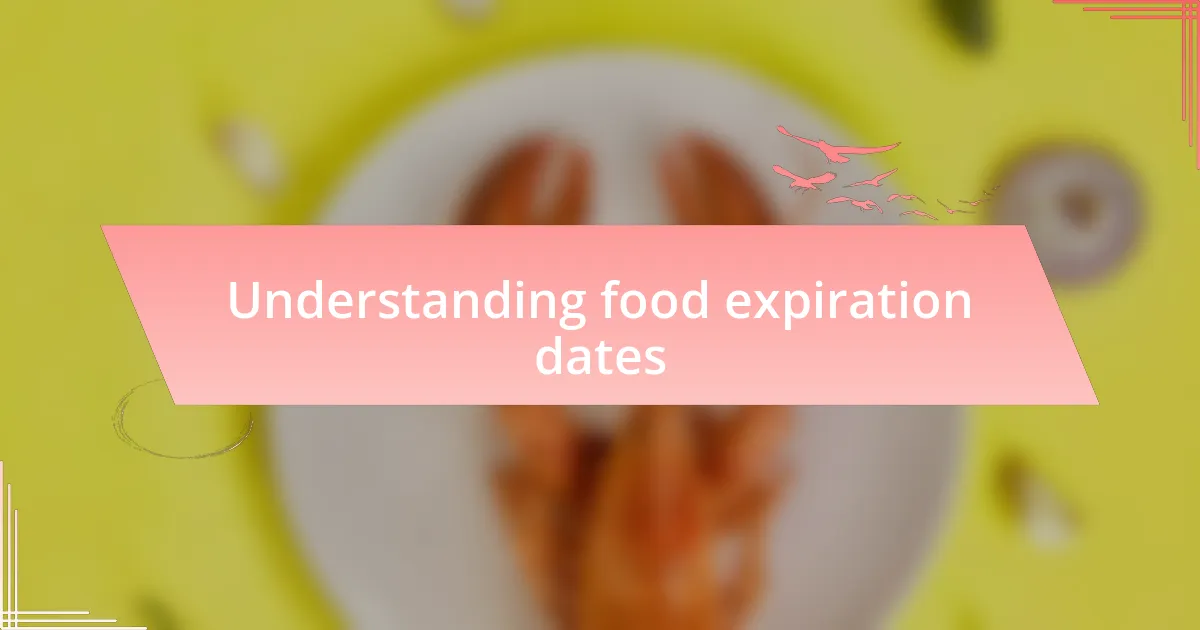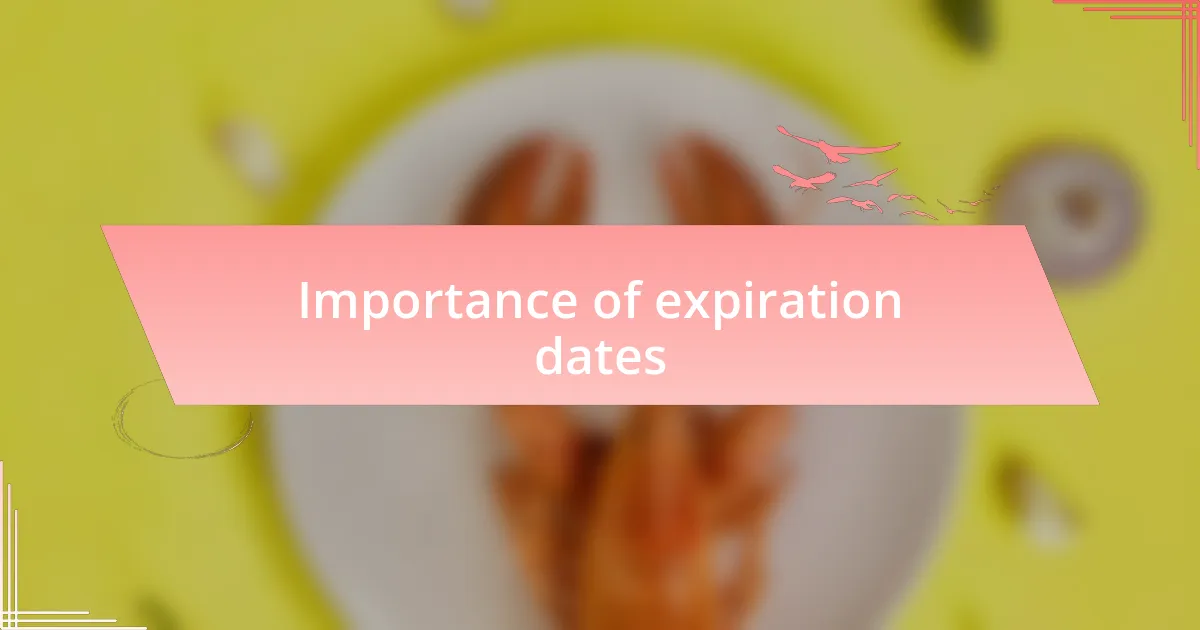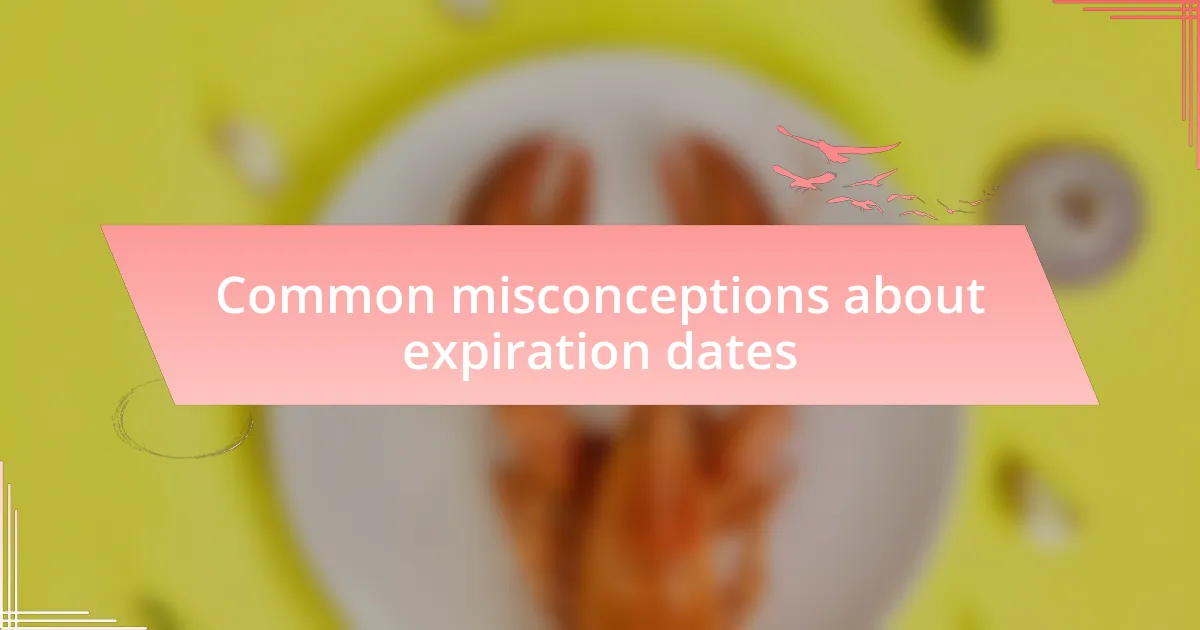Key takeaways:
- Understanding different expiration dates, such as “sell by,” “use by,” and “best before,” is crucial for food safety and waste reduction.
- Many consumers mistakenly discard food immediately after the expiration date, despite it often being still safe to consume.
- Using personal judgment and sensory evaluation can lead to more informed decisions about food safety instead of strictly relying on printed dates.
- Expiration dates can evoke fears and misconceptions that contribute to unnecessary food waste, highlighting the need for awareness and education.

Understanding food expiration dates
Food expiration dates can often be confusing, as they come in several forms such as “sell by,” “use by,” and “best before.” When I first started navigating the grocery aisles, I’ll admit that I ignored these labels, believing they were merely suggestions. However, I quickly learned that each term holds specific meanings. How many of us have thrown food away simply because it had passed its date?
The “sell by” date is primarily for retailers; it guides them on how long to keep the product visible on the shelf. I remember a particular instance when I saved a perfectly fine yogurt just a few days past its sell-by date. It made me question how often we discard food unnecessarily, hurtling it into landfills when it could still be consumed.
On the other hand, a “use by” date is more critical for safety, indicating when a product is at its peak quality. This awareness changed my approach to meal planning. I started to check these dates more carefully, and now, I organize my fridge with items nearing expiration at the front. It’s not just about waste; it’s about making better use of the food I have and being more resourceful in the kitchen. How do you handle your food expiry concerns?

Importance of expiration dates
Expiration dates are crucial for ensuring food safety and quality. I remember a friend who experienced a stomach bug because she consumed a salad dressing that had long surpassed its “use by” date. That incident opened my eyes to the importance of adhering to these labels, especially for perishable items. Wouldn’t you agree that one bad experience could lead to more cautious behavior in the future?
The distinction between “best before” and “use by” may seem minor, but it significantly impacts how I perceive food freshness. For instance, I once had a pack of crackers that were past their “best before” date but still tasted perfectly fine. This realization shifted my thinking; not all expired foods are unsafe. Instead, understanding what those dates represent helps me make informed decisions instead of discarding food simply due to preconceived notions.
Furthermore, the importance of expiration dates extends beyond personal health; it has broader implications for food waste reduction. Reflecting on the sheer volume of food wasted every year, I feel a sense of responsibility to be more mindful. So, how do expiration dates influence your grocery shopping habits? Emphasizing these dates can empower us to make sustainable choices, ultimately contributing to a more efficient food system.

Common misconceptions about expiration dates
Expiration dates can often create confusion for consumers. A common misconception is that food is inherently unsafe the moment it hits its expiration date. I’ve had moments where I hesitated to use items like yogurt because they passed their date, only to discover that they were still perfectly good days later. Isn’t it frustrating how a simple date can evoke fear, even when our senses tell us otherwise?
Another prevalent belief is that all foods have the same type of expiration labels and that those labels are absolute. For instance, I used to think that canned goods were vastly different from dairy products regarding safety and freshness. However, I learned that an unopened can of soup could last for years beyond its date if stored correctly. This realization led me to rethink how I approach food expiration and appreciate the nuances behind various products’ longevity.
Lastly, many people throw out items based solely on the date printed on the packaging, without considering their own judgment. I remember my surprise when I found spices in my pantry that were years past their “best before” dates, yet they still added flavor to my dishes. Isn’t it interesting how relying solely on a printed date can lead to unnecessary waste, especially when our own experiences can provide a more accurate gauge of food safety?

Lessons learned from my journey
Through my journey, I’ve learned that using my senses can often guide me better than any printed date. I once opened a jar of pickles that had long since passed its “best by” date. They smelled just fine and tasted even better than I remembered. This experience taught me the importance of relying on my own judgment rather than fearfully discarding food simply because of a date.
Another valuable lesson came when I discovered the surprising longevity of certain items in my pantry. There was a box of pasta that sat there for years, well past its expiration. When I finally cooked it, it turned out perfectly al dente. I found it eye-opening how certain foods can retain their quality long after the date has passed, which made me reflect on the misconceptions we often hold about expiration dates.
Emotional connections with food also played a big role in my learning. I felt a sense of nostalgia when I opened a bag of frozen berries that were over a year old. They still tasted fresh in my smoothie, reminding me of baking with my grandmother. Realizing that expiration dates don’t always signify the end of a product, but rather an invitation to savor memories, shifted my perspective dramatically. Do we sometimes overlook the stories behind our food in the rush to conform to these labels?